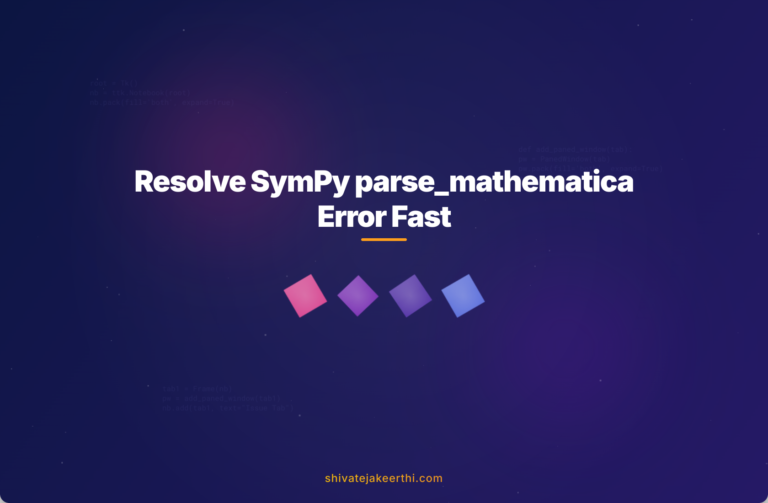Parsing Mathematica expressions using SymPy‘s parse_mathematica function is a common task for developers and mathematicians alike. However, encountering errors like SymPy parse_mathematica Error can halt your progress, especially when dealing with seemingly simple Mathematica expressions.
SymPy is a powerful Python library widely used for symbolic mathematics, making computations clearer and more intuitive. One handy feature in SymPy is the parse_mathematica utility, designed specifically to allow users to convert Mathematica expressions directly into SymPy-compatible Python code.
Understanding and resolving related errors quickly is critical because Mathematica and Python are staples in the industry’s computation toolkit. Let’s examine this common parsing error, what causes it, and how to resolve it effectively.
Brief Explanation of SymPy and parse_mathematica
SymPy is an open-source Python library for symbolic mathematics, enabling symbolic computation, simplification of expressions, solving equations, calculus, and more. It’s highly beneficial for both education and professional use because of its ease of operation in handling algebraic problems symbolically.
Specifically, the function parse_mathematica within SymPy helps bridge the gap between Mathematica’s syntax and Python. Mathematica’s syntax has distinct conventions, such as using square brackets for function calls and curly brackets for lists. The parse_mathematica function handles these conversions automatically, improving interoperability between these two powerful platforms.
SymPy parse_mathematica Error
Occasionally, users encounter parsing errors—even on straightforward Mathematica expressions. Consider a simple Mathematica expression like:
Sin[x] + Cos[y]^2
Intuitively, this should convert smoothly into SymPy, but when attempting to parse this particular expression, the following error might emerge.
Test Scenario for the Error
Let’s explore the common code snippet used and its subsequent error message.
Example Python snippet:
from sympy.parsing.mathematica import parse_mathematica
expr = "Sin[x] + Cos[y]^2"
result = parse_mathematica(expr)
print(result)
Running this simple script could lead to an unexpected traceback or error message, similar to:
Traceback (most recent call last):
File "test.py", line 4, in <module>
result = parse_mathematica(expr)
...
TypeError: 'Symbol' object is not callable
Error Message Analysis
The essential part of understanding this error message lies in the TypeError that states: ‘Symbol’ object is not callable.
The traceback here tells us that the parsing process recognizes an item as a symbol where it expected a callable function instead. In Mathematica expressions, square brackets denote functions, while SymPy might incorrectly interpret these particular bracketed items as objects or symbols incorrectly.
Understanding the Root Cause of the Error
In Python’s symbolic world, a TypeError generally indicates something has gone wrong regarding the distinction between symbols and callable objects. A symbol, for instance, represents a variable like x or y, while callable items typically represent operations or methods, like sin() or cos().
Two specific causes of this error usually are:
- Incorrect Usage of parse_mathematica: Using square brackets may confuse Python when interpreting symbols versus functions.
- Compatibility Issues: An older version of SymPy might lack the latest syntax handling capabilities required for specific Mathematica expressions.
Troubleshooting Steps for the parse_mathematica Error
Resolving this parsing issue begins with a few essential Python debugging techniques.
- Check Python Environment: Use commands like
pip show sympyto verify you have the latest library version. - Review Function Arguments: Check if your SymPy setup accurately supports the Mathematica syntax you attempt to parse.
To upgrade your SymPy library, run this command:
pip install --upgrade sympy
Another common solution is modifying the Mathematica input expression itself. For instance, rewriting your expression slightly to aid SymPy might help.
Instead of:
Sin[x] + Cos[y]^2
Try changing the expression to its Python equivalent explicitly if parse_mathematica continues giving errors:
sin(x) + cos(y)**2
Although this defeats the simplification goal, it’s a reliable fallback.
Real-World Use Cases and Examples
Mathematica users often encounter much more complicated expressions. For example, integrating symbolic matrices, complicated trigonometric expressions, or advanced calculus notations can impose challenges:
Integrate[Exp[-x^2], {x, -Infinity, Infinity}]
SymPy parsing can often handle these smoothly, provided the syntax aligns. Successful parsing is common and highly beneficial for users migrating complex numerical and symbolic computations from Mathematica into Python for easier data integration, analysis, and visualization.
Best Practices for parse_mathematica
To ensure efficient and smooth parsing from Mathematica to SymPy:
- Verify Input Expressions: Always review Mathematica expressions to ensure correct syntax compatible with SymPy standards.
- Handle Mathematical Functions: Be cautious of unpredictable translations of special Mathematica functions by first converting common symbols explicitly yourself.
Moreover, consider referring directly to the SymPy documentation frequently since their developers regularly update parsing capabilities and specifics.
If you’re dealing specifically with Python and symbol manipulations, my site offers resources about similar Python issues. Check out more in-depth advice and solutions in this article category: Python articles.
Remember, parsing issues like this one can happen anytime interoperability between different symbolic computational tools come into play—anticipating common errors makes your workflow smoother and more efficient.
Resolving the SymPy parse_mathematica Error saves time and contributes significantly to consistent workflows, especially in academic research, data science, and software development involving symbolic computation.
As SymPy continues evolving, future versions may further minimize issues like these, enhancing ease of parsing complex Mathematica expressions. Staying informed about updates and regularly troubleshooting errors proactively enhances your overall programming proficiency in symbolic computation.
Have you encountered similar parsing challenges when transitioning expressions from Mathematica to SymPy? Share your tips below or reach out if you have unresolved issues that you’d like to discuss!



0 Comments